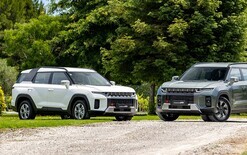Rebates ‘backward step’ on safety

The boss of Toyota New Zealand says he is “frustrated” the government appears to be taking a backward step on vehicle safety with its rebate scheme for electric vehicles (EVs).
Neeraj Lala, chief executive officer, has spoken of his concerns and says safety, along with availability and affordability, are the three main challenges to transitioning to a greener fleet.
Under the clean-car discount announced by Michael Wood, Minister of Transport, on June 13, pure electric vehicles (EVs) and plug-in hybrid vehicles will be entitled to a rebate from July 1, 2021.
Vehicles only need to have a three-star safety rating to get the rebate. However, Lala points out the government has long been campaigning for consumers to choose vehicles with four or five-star ratings.
“I’m frustrated around the safety-rating aspect because you can’t sacrifice safety for low emissions,” he told Autofile Online.
“For decades the MoT [Ministry of Transport] has been pushing its Safer Journeys strategy and trying to get the road toll to zero. We support that campaign but the challenge now is it appears a three-star EV is fine when a car with that rating has never been fine and in my mind that’s a step backwards.”
Lala, pictured, notes supply constraints will pose a problem in getting more low-emissions vehicles into New Zealand’s fleet and that many EVs “aren’t going to be affordable for everyone for some time yet”.
“I do genuinely believe that Minister Wood and his team are listening and they have made real progress,” he adds. “We all knew the transition period would be a tough one and we will continue to work with them to make the journey efficient and continue discussing these issues.”
Electric utes
Toyota says there are no plans to have a pure-electric ute in its New Zealand product range for the next 18-24 months.
The marque issued a statement after members of the government suggested on June 14 that such a vehicle may soon be available.
Lala says: “It is irresponsible to suggest that customers stop buying non-electric vehicles immediately until there is an electric option available.
“The range and volumes of EVs needed to meet demand is simply not available and many customers still need a vehicle to transport their family or operate their business.”
Toyota NZ says there have been 5,296 EV sales over the past five years and of those 45 per cent fall into the luxury market. In comparison, there have been 23,257 hybrid sales over the same period.
“Our extensive hybrid range has allowed us to contribute to 43 per cent of the overall reduction of CO2 emissions over the past five years in New Zealand,” he adds.
“Hybrid technology is more readily available and is significantly more affordable for everyday Kiwis. Battery-electric technology is coming but is not quite there yet.
“As a brand, we are focused on achieving affordability of low-emission technology for everyday Kiwis – not just the top two per cent.”
Global constraints around battery production, the semiconductor crisis, and technology adoption could mean that the rate of EVs arriving into New Zealand’s market will be under considerable pressure.
Toyota also has concerns about the decoupling of technology in the feebate scheme and is looking at its options of how to support customers who want to transition to low-emissions vehicles that do not qualify for the rebate until January 1, 2022.
At the end of 2021, Toyota will have its first fully electric model in the Lexus UX300e available.
This will be followed by the battery electric Toyota BZ4X SUV in 2022. A Hilux will not be available in a pure electric powertrain in the next two years.





